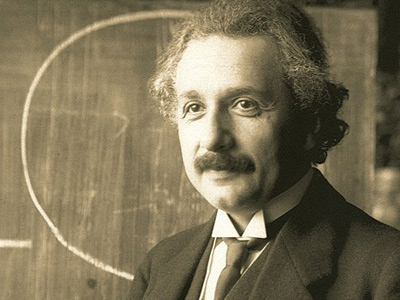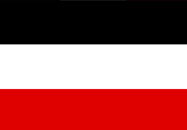Albert Einstein (1879–1955)
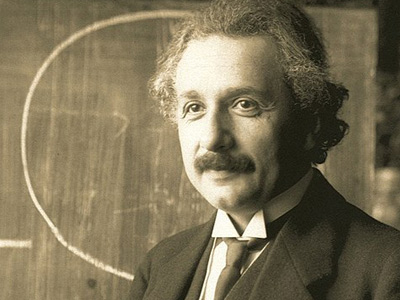
Biography
Early life and education
Albert Einstein was born in Ulm, in the Kingdom of Württemberg in the German Empire, on 14 March 1879. His parents were Hermann Einstein, a salesman and engineer, and Pauline Koch. In 1880, the family moved to Munich, where Einstein's father and his uncle Jakob founded Elektrotechnische Fabrik J. Einstein and Cie, a company that manufactured electrical equipment based on direct current.
The Einsteins were non-observant Ashkenazi Jews, and Albert attended a Catholic elementary school in Munich from the age of 5 for three years. At the age of 8, he was transferred to the Luitpold Gymnasium (now known as the Albert Einstein Gymnasium), where he received advanced primary and secondary school education until he left the German Empire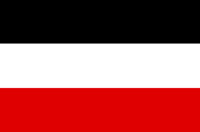 The German Empire, also referred to as Imperial Germany, the Second Reich, as well as simply Germany, was the period of the German Reich from the unification of Germany in 1871 until the November Revolution in 1918, when the German Reich changed its form of government from a monarchy to a republic. During its 47 years of existence, the German Empire became the industrial, technological, and scientific giant of Europe. seven years later.
The German Empire, also referred to as Imperial Germany, the Second Reich, as well as simply Germany, was the period of the German Reich from the unification of Germany in 1871 until the November Revolution in 1918, when the German Reich changed its form of government from a monarchy to a republic. During its 47 years of existence, the German Empire became the industrial, technological, and scientific giant of Europe. seven years later.
In 1894, Hermann and Jakob's company lost a bid to supply the city of Munich with electrical lighting because they lacked the capital to convert their equipment from the direct current (DC) standard to the more efficient alternating current (AC) standard. The loss forced the sale of the Munich factory. In search of business, the Einstein family moved to Italy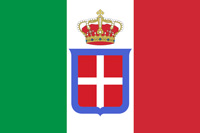 The Kingdom of Italy was a state that existed from 1861, when Victor Emmanuel II of Sardinia was proclaimed King of Italy, until 1946. The state resulted from a decades-long process, the Risorgimento, of consolidating the different states of the Italian Peninsula into a single state. That process was influenced by the Savoy-led Kingdom of Sardinia, which can be considered Italy's legal predecessor state., first to Milan and a few months later to Pavia. When the family moved to Pavia, Einstein stayed in Munich to finish his studies at the Luitpold Gymnasium. His father intended for him to pursue electrical engineering, but Einstein clashed with authorities and resented the school's regimen and teaching method. He later wrote that the spirit of learning and creative thought was lost in strict rote learning. At the end of December 1894, he travelled to Italy to join his family in Pavia, convincing the school to let him go by using a doctor's note. During his time in Italy he wrote a short essay with the title "On the Investigation of the State of the Ether in a Magnetic Field".
The Kingdom of Italy was a state that existed from 1861, when Victor Emmanuel II of Sardinia was proclaimed King of Italy, until 1946. The state resulted from a decades-long process, the Risorgimento, of consolidating the different states of the Italian Peninsula into a single state. That process was influenced by the Savoy-led Kingdom of Sardinia, which can be considered Italy's legal predecessor state., first to Milan and a few months later to Pavia. When the family moved to Pavia, Einstein stayed in Munich to finish his studies at the Luitpold Gymnasium. His father intended for him to pursue electrical engineering, but Einstein clashed with authorities and resented the school's regimen and teaching method. He later wrote that the spirit of learning and creative thought was lost in strict rote learning. At the end of December 1894, he travelled to Italy to join his family in Pavia, convincing the school to let him go by using a doctor's note. During his time in Italy he wrote a short essay with the title "On the Investigation of the State of the Ether in a Magnetic Field".
In 1895, at the age of 16, Einstein took the entrance examinations for the Swiss Federal Polytechnic in Zürich (later the Eidgenössische Technische Hochschule, ETH). He failed to reach the required standard in the general part of the examination, but obtained exceptional grades in physics and mathematics. On the advice of the principal of the Polytechnic, he attended the Argovian cantonal school (gymnasium) in Aarau, Switzerland Switzerland, officially the Swiss Confederation, is a landlocked country located at the confluence of Western, Central and Southern Europe. It joined the United Nations only in 2002, though it pursues an active foreign policy, including participation in frequent peace-building processes worldwide. Switzerland is the birthplace of the Red Cross, one of the world's oldest and best-known humanitarian organizations, and hosts the headquarters or offices of most major international institutions., in 1895–96 to complete his secondary schooling. While lodging with the family of professor Jost Winteler, he fell in love with Winteler's daughter, Marie. (Albert's sister Maja later married Winteler's son Paul.) In January 1896, with his father's approval, Einstein renounced his citizenship in the German Kingdom of Württemberg to avoid military service. In September 1896, he passed the Swiss Matura with mostly good grades, including a top grade of 6 in physics and mathematical subjects, on a scale of 1–6. At 17, he enrolled in the four-year mathematics and physics teaching diploma program at the Zürich Polytechnic. Marie Winteler, who was a year older moved to Olsberg, Switzerland, for a teaching post.
Switzerland, officially the Swiss Confederation, is a landlocked country located at the confluence of Western, Central and Southern Europe. It joined the United Nations only in 2002, though it pursues an active foreign policy, including participation in frequent peace-building processes worldwide. Switzerland is the birthplace of the Red Cross, one of the world's oldest and best-known humanitarian organizations, and hosts the headquarters or offices of most major international institutions., in 1895–96 to complete his secondary schooling. While lodging with the family of professor Jost Winteler, he fell in love with Winteler's daughter, Marie. (Albert's sister Maja later married Winteler's son Paul.) In January 1896, with his father's approval, Einstein renounced his citizenship in the German Kingdom of Württemberg to avoid military service. In September 1896, he passed the Swiss Matura with mostly good grades, including a top grade of 6 in physics and mathematical subjects, on a scale of 1–6. At 17, he enrolled in the four-year mathematics and physics teaching diploma program at the Zürich Polytechnic. Marie Winteler, who was a year older moved to Olsberg, Switzerland, for a teaching post.
Einstein's future wife, Mileva Marić, also enrolled at the Polytechnic that year. She was the only woman among the six students in the mathematics and physics section of the teaching diploma course. Over the next few years, Einstein and Marić's friendship developed into romance, and they read books together on extra-curricular physics in which Einstein was taking an increasing interest. In 1900, Einstein was awarded the Zürich Polytechnic teaching diploma, but Marić failed the examination with a poor grade in the mathematics component, theory of functions. There have been claims that Marić collaborated with Einstein on his 1905 papers, known as the Annus Mirabilis papers, but historians of physics who have studied the issue find no evidence that she made any substantive contributions.
HISTORY
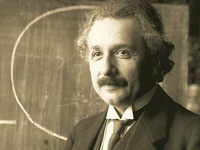
RESOURCES
This article uses material from the Wikipedia article "Albert Einstein", which is released under the Creative Commons Attribution-Share-Alike License 3.0.
© Stories Preschool. All Rights Reserved.
